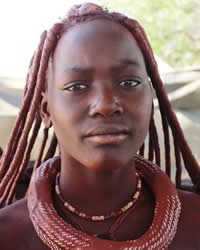Dhimba in Angola

Photo Source:
Anonymous
|
Send Joshua Project a map of this people group.
|
| People Name: | Dhimba |
| Country: | Angola |
| 10/40 Window: | No |
| Population: | 37,000 |
| World Population: | 45,700 |
| Primary Language: | Dhimba |
| Primary Religion: | Christianity |
| Christian Adherents: | 70.00 % |
| Evangelicals: | 25.00 % |
| Scripture: | New Testament |
| Ministry Resources: | Yes |
| Jesus Film: | No |
| Audio Recordings: | Yes |
| People Cluster: | Bantu, Central-Southwest |
| Affinity Bloc: | Sub-Saharan Peoples |
| Progress Level: |
|
Introduction / History
The Dhimba people in Angola speak a Bantu language called Dhimba. It is part of the Herero language cluster and is closely related to the language spoken by the Himba people of Namibia.
The Dhimba language is still used actively in daily life among the Dhimba, although literacy in the language is limited. Over time, Portuguese has also become increasingly used in education and administration; however, the Dhimba have managed to preserve their mother tongue in their homes and communities.
Historically, the Dhimba are semi-nomadic pastoralists and may be culturally linked to the Himba and Herero peoples. They inhabit remote regions of southwestern Angola, particularly in Cunene Province near the Namibian border, where they have maintained many of their traditional practices despite modernization and political change.
What Are Their Lives Like?
Most Dhimba live in small rural communities in semi-arid areas of Angola, particularly in Cunene Province. Their daily life revolves around herding cattle, goats, and sheep, which are vital to their culture, economy, and social status. In addition to herding, they cultivate small plots of land where they grow maize, millet, and other subsistence crops.
Dhimba houses are typically round huts made from natural materials like wood, mud, and grass. Women play a central role in maintaining homes, raising children, and managing food preparation, while men are primarily responsible for herding and decision-making within the family.
The Dhimba dress in traditional clothing made from animal hides, adorned with beads and jewelry. Body decoration, such as the use of red ochre and elaborate hairstyles, remains a strong part of their identity, especially among women. Despite increasing exposure to urban life and modern influence, many Dhimba continue to live according to long-standing cultural customs.
What Are Their Beliefs?
Many Dhimba identify as Christian, and the influence of Christianity has been growing in recent decades through mission efforts and church planting. However, only a small percentage are considered Evangelical believers, and a large number continue to mix Christian teachings with traditional religious beliefs.
Traditional Dhimba religion includes reverence for ancestors, use of sacred fire, and rituals related to cattle, fertility, and healing. Many families still consult spiritual leaders or diviners to seek guidance and protection. These practices are deeply embedded in the Dhimba worldview and are often maintained even by those who attend church.
There is an ongoing need for deeper discipleship and contextualized Christian teaching that respects their culture while introducing a biblical worldview.
What Are Their Needs?
The Dhimba people need a full translation of the Bible in their heart language, Dhimba, so they can engage with all of Scripture in a way that resonates deeply with their hearts and cultural context. To support new believers and the growth of local churches, they also require more Christian materials—such as audio Scriptures, Bible stories, and discipleship resources—in Dhimba.
Accessible education is another key need, particularly bilingual programs that incorporate both Dhimba and Portuguese to boost literacy while preserving their linguistic heritage. In many Dhimba communities, healthcare access remains limited, creating a need for mobile clinics, trained health workers, and education in maternal and child health, especially in rural areas. Clean water is a persistent challenge, and improved infrastructure—such as wells and rainwater collection systems—is essential to ensure a safe and reliable water supply throughout the year. Economic development is also vital for long-term sustainability; the Dhimba need support in areas such as livestock health, protection of grazing land, and improved market access for their agricultural and animal products. Finally, local churches require trained, culturally aware leaders who can disciple others and plant churches within Dhimba communities, using their own language and honoring their traditions.
Prayer Points
Pray that a full and accurate Bible would be translated into Dhimba and made widely available in audio formats so that even those who cannot read may hear God's Word.
Pray that the Dhimba people would come to know Jesus in a personal and life-changing way, and that the gospel would spread throughout their communities.
Pray for the development of Christian leaders among the Dhimba who understand both their culture and the gospel, and who can teach others with faithfulness and clarity.
Pray for quality education for Dhimba children, especially programs that value their language.
Pray that healthcare would reach remote communities. Ask for sustainable access to clean water in Dhimba villages.